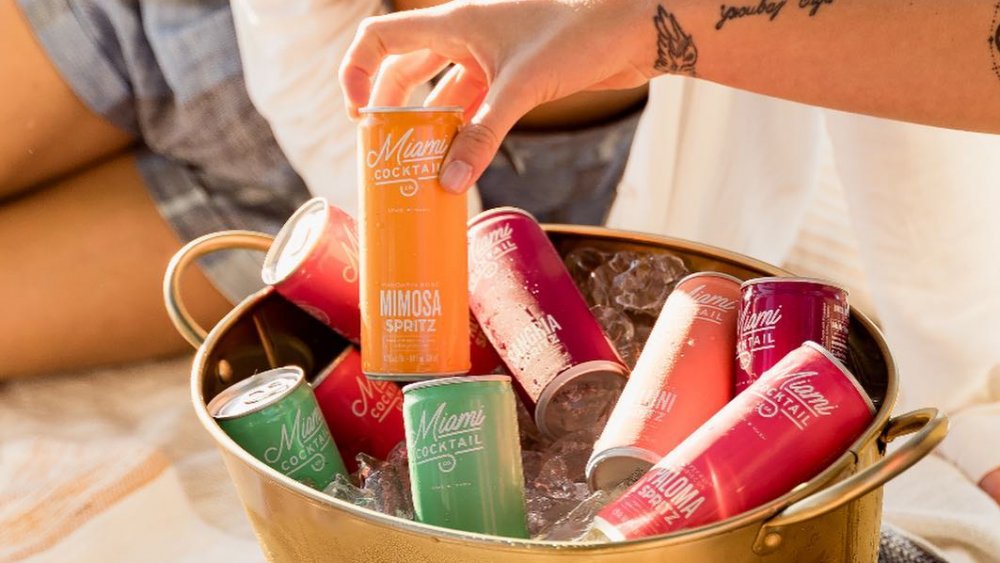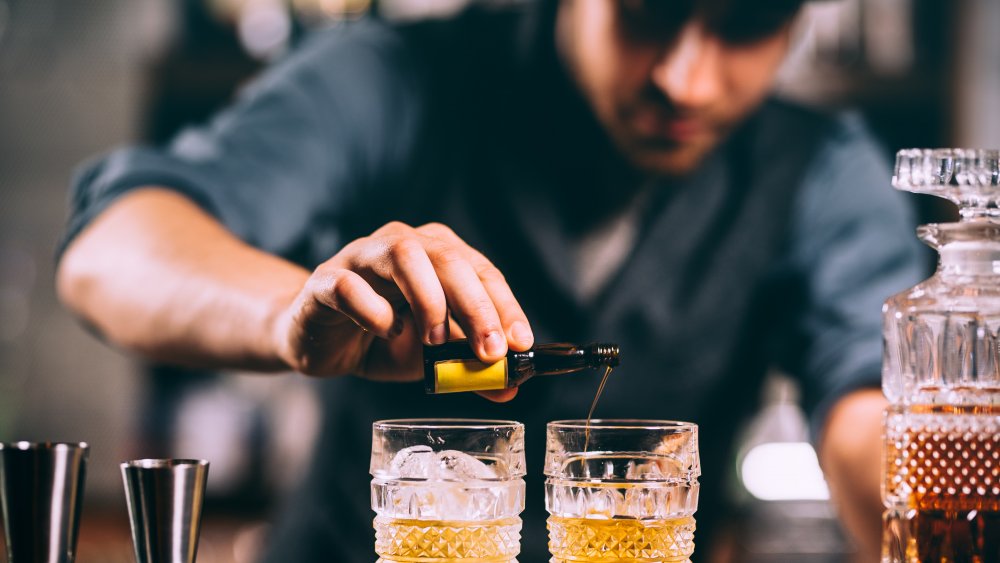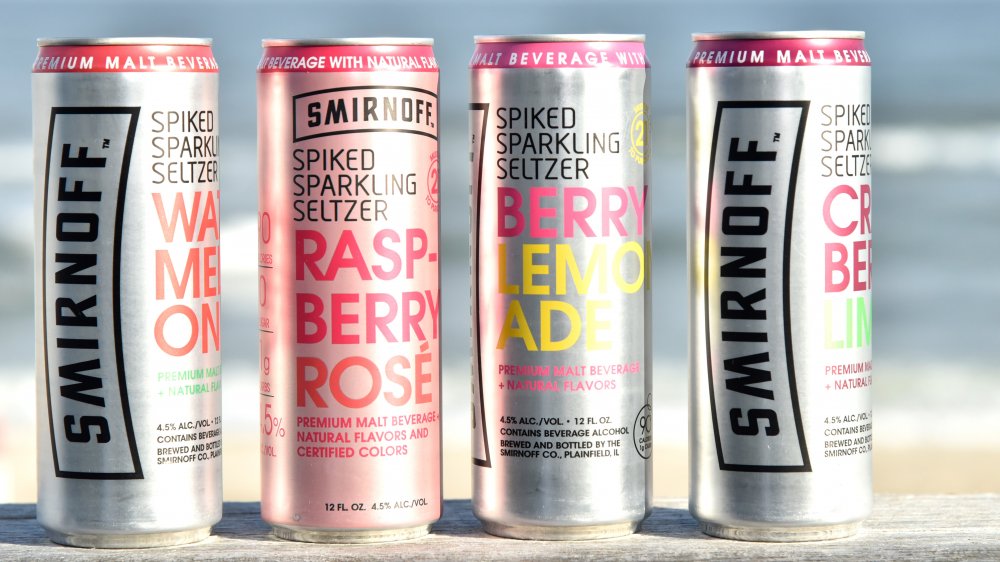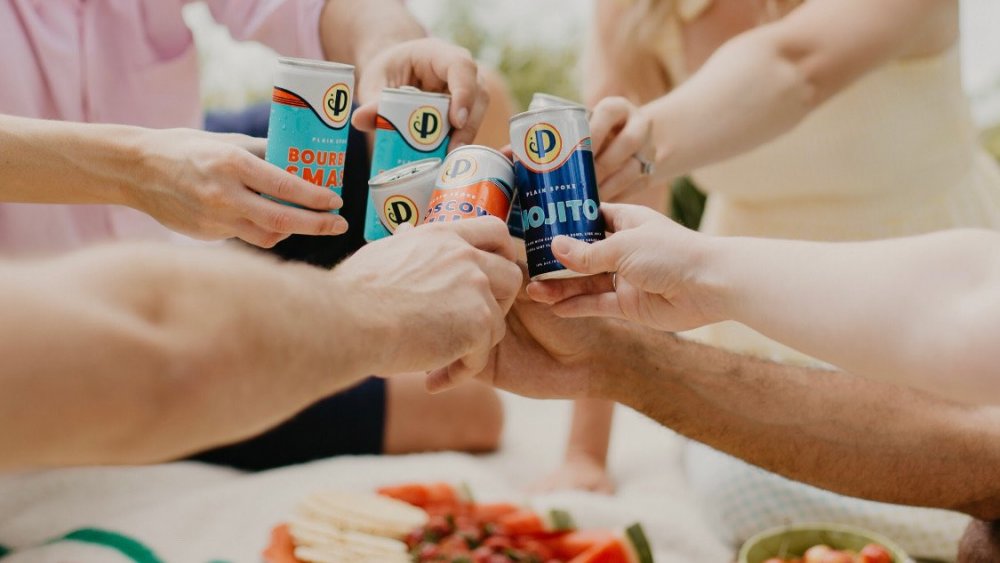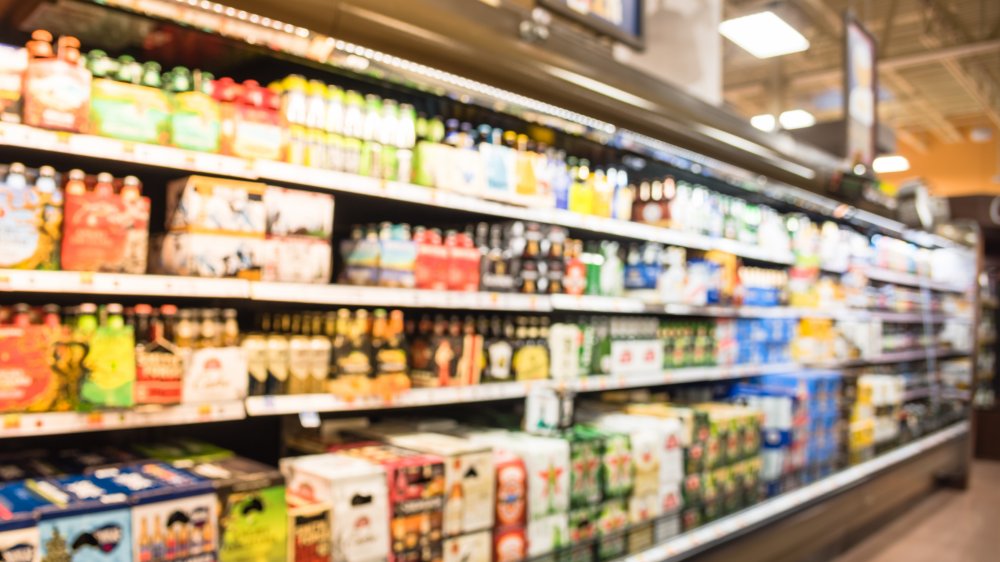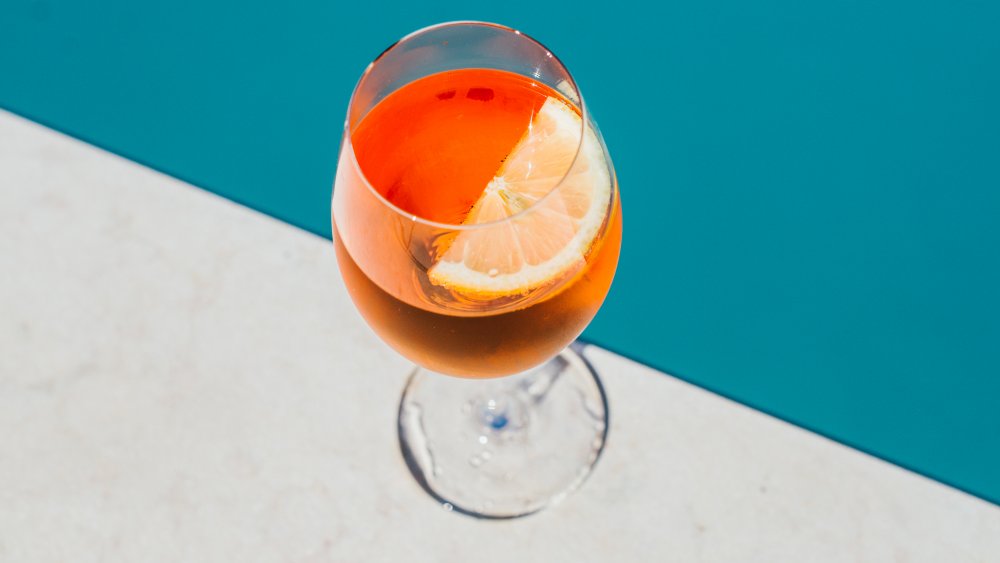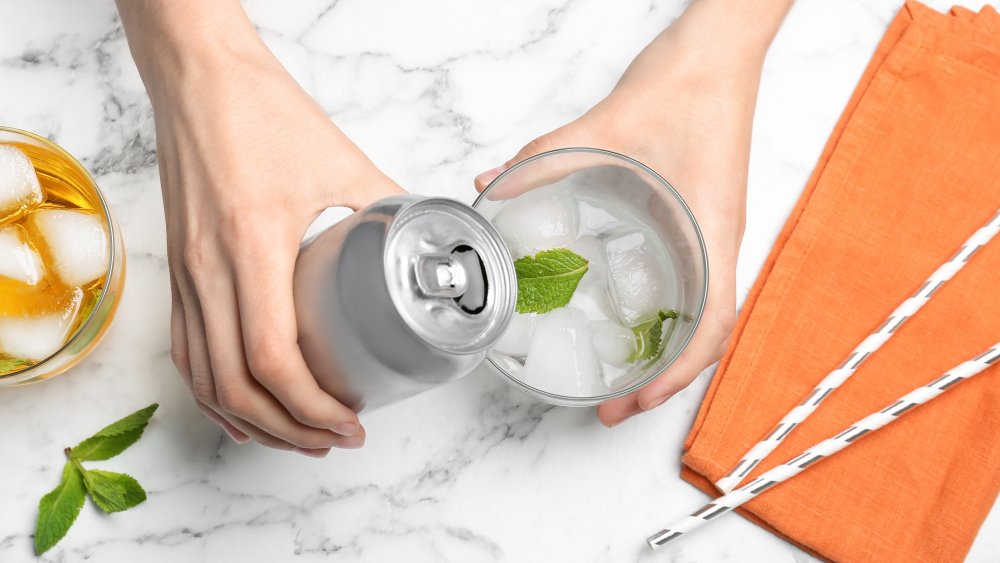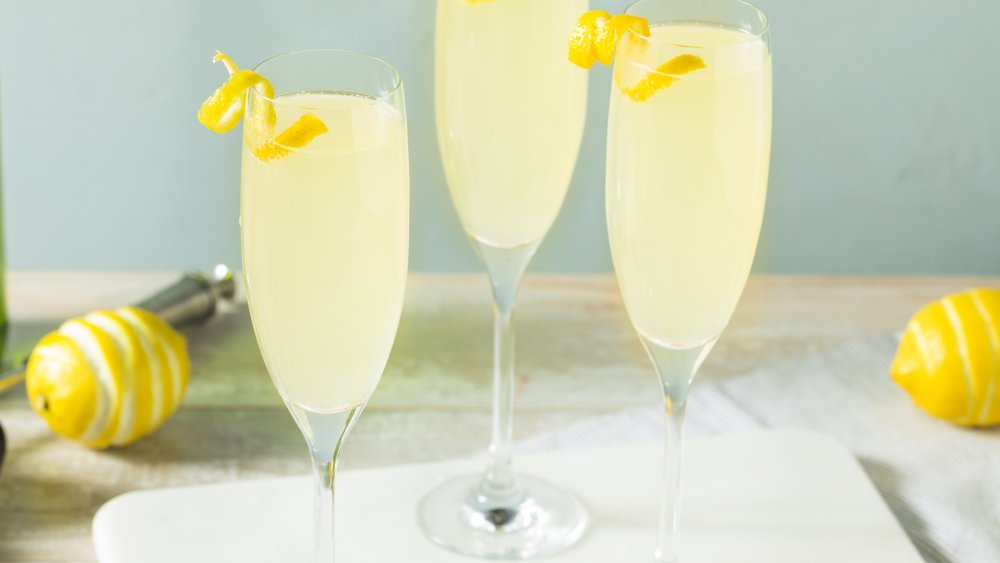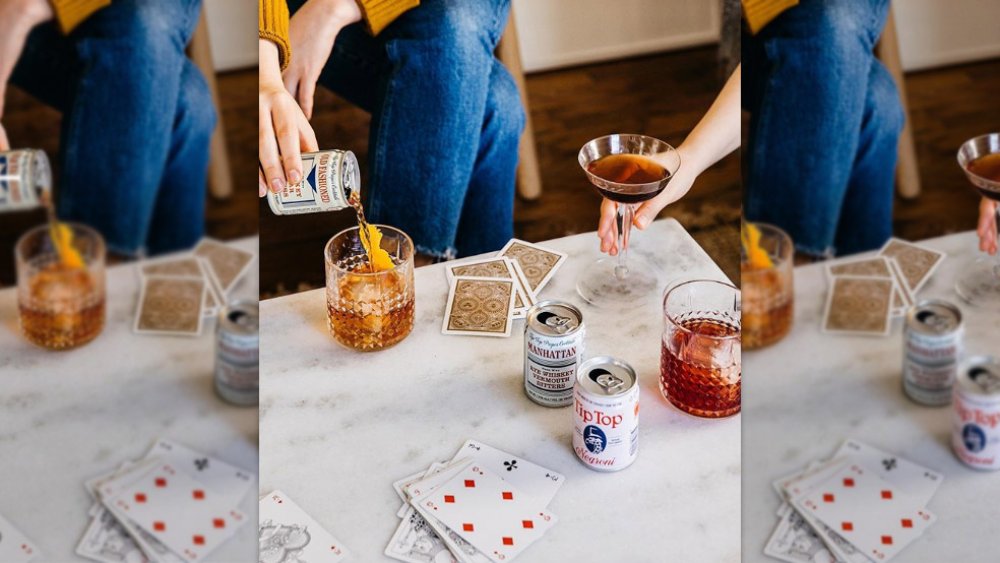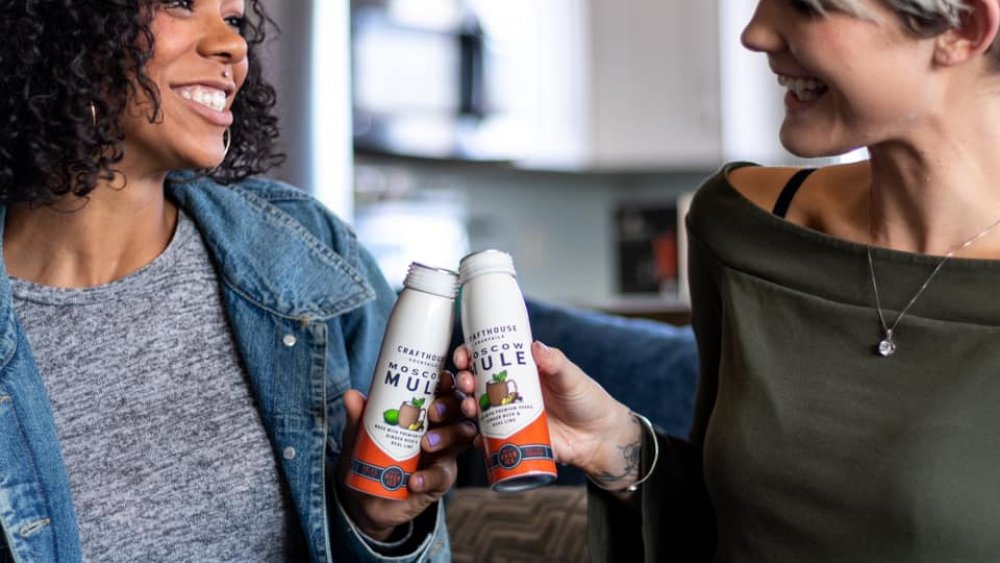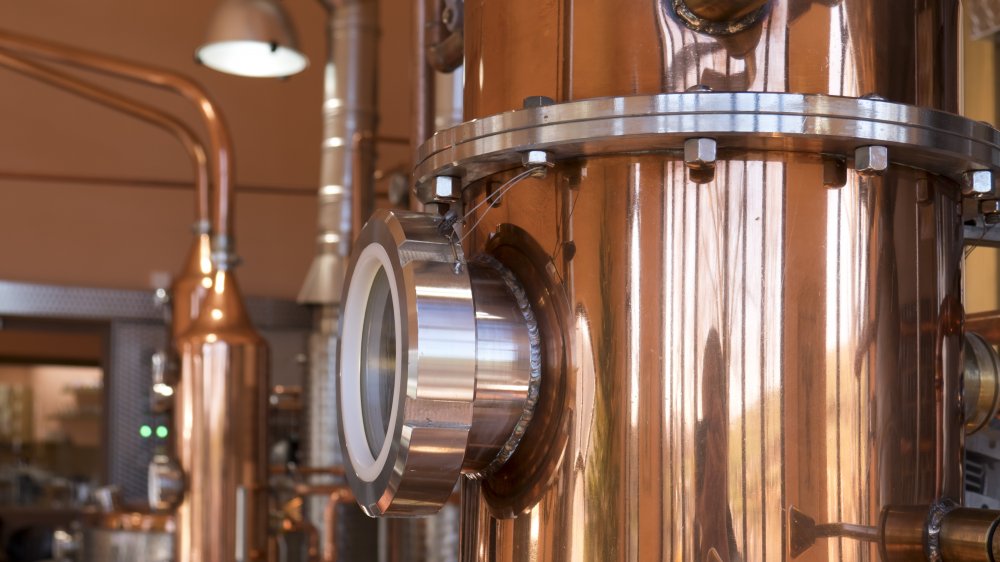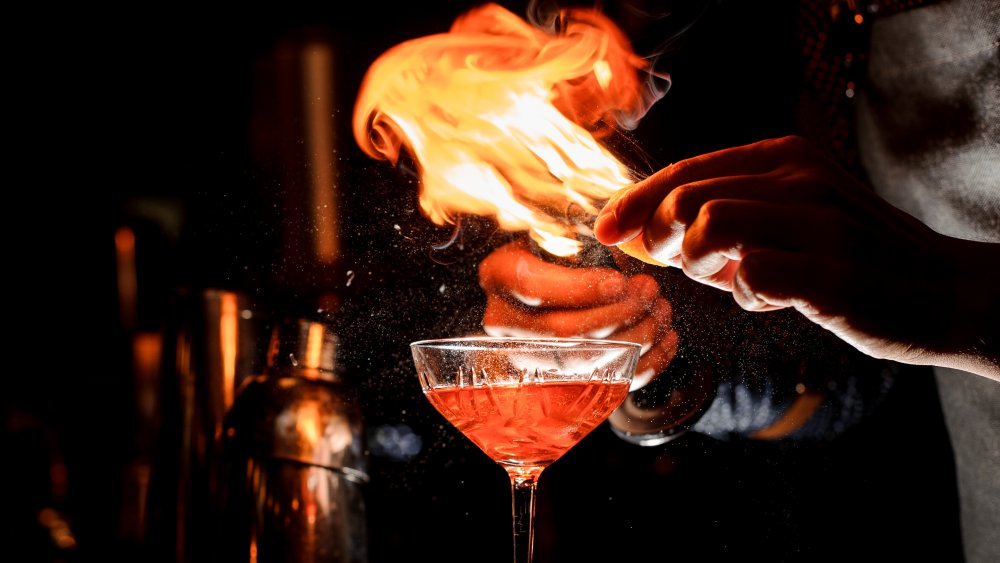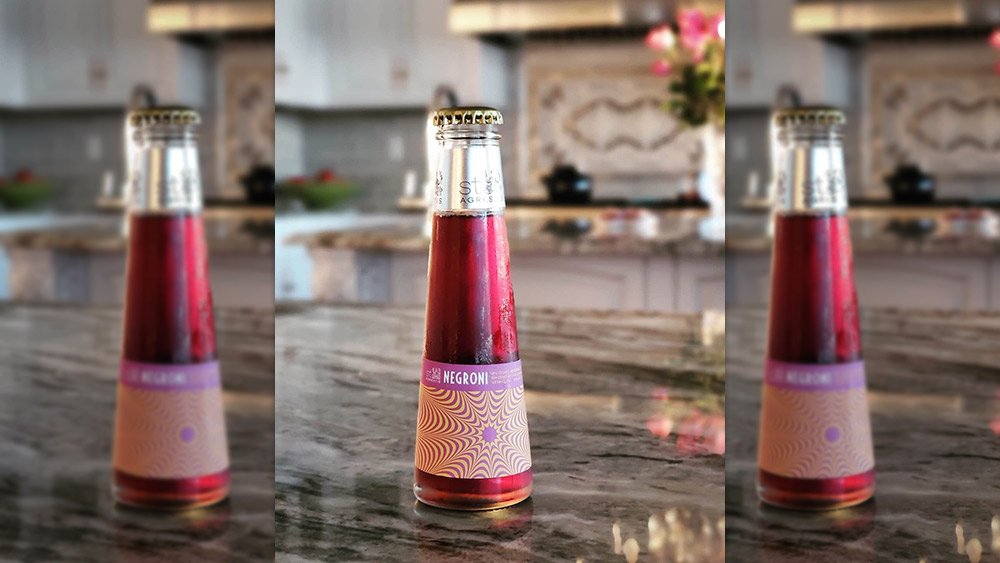The Truth About Canned Cocktails
Summer is almost here and the drinking is easy. Or it should be. Now's the time to relax with an iced coffee, lemonade, or simply a frosty beer – hammock optional.
But what if you want something a bit more, well, spirited, in the truest sense of the word? A drink that feels like a true reward at the end of a very long day. A drink that makes everyone's favorite season of beach, sand, and surf a lot more entertaining. A drink that you might even remember months from now, as summer turns to fall, and you find yourself recounting the highlights of the sun-and-fun season.
The canned cocktail is all that — and much more. The truth about canned cocktails? They offer flavor, variety, ingenuity, and convenience, plus an alcoholic punch. Ranging from light and breezy to complex and boozy, canned cocktails just may be the ideal way to enjoy your favorite libations — and acquire a taste for new drink sensations. Move over, wine in a can, the canned cocktail may just be the new star of summer drinking.
RTD (ready-to-drink) cocktails taste just as good as the real thing
Let's be clear on this point: It wasn't always the case. The canned cocktails available on grocery and liquor store shelves today are a different species than the overly sweet, malt-based canned cocktails that you may have sipped (and poured out) a decade (or way more) ago. Today, the best contemporary canned cocktails rely on superior ingredients, with real, top-shelf spirits lending canned concoction the taste of freshly mixed cocktails. And sometimes they're even dreamt up by professional bartenders.
According to Eater, many makers of canned cocktails try dozens of formulations, experimenting with different levels of sweetness, acidity, flavor, and alcohol, before putting the winning recipe into production. The canned cocktails we're now popping and sipping are created with top-quality spirits, sometimes distilled in-house, and food-grade ingredients, including house-made cocktail bases. And the ingredients that go into canned cocktails impact more than just taste. They also play a role in how long they will last on the shelf, how carbonated they will be (and most canned cocktails, it turns out, are carbonated) plus how high or low the alcohol content.
The explosive craft cocktail scene has certainly fanned the fires of innovation, only these delicious canned tipples are oftentimes sipped far away from the bar.
Canned cocktails are distant cousins to hard seltzers
First came flavored seltzers. Then, in 2016, the makers of Mike's Hard Lemonade launched White Claw, a hard seltzer that became a game-changer for the category. Today, White Claw comes in flavors such as ruby grapefruit, mango, and black cherry, at just 70 to 100 calories each. No surprise, the category has become one of the biggest beverage trends to emerge in the last few years.
As Spruce Eats reminds us, hard seltzers (or spiked seltzers) don't contain any distilled spirits. Instead, they're made in a similar fashion to beer. Sugar is combined with carbonated water and then it's fermented with the introduction of yeast, so that sugars are transformed into alcohol. Depending on the maker, some are dolled up with natural or artificial flavors and some use other fermentable bases, like barley or rice. The end result is a low calorie, low-carb, usually low-alcohol carbonated drink that has one or two grams of sugar per serving or no sugar at all.
And while a hard seltzer can certainly be enjoyed alone, it can also be a great base for experimentation (maybe adding, say, a shot of liquor.)
Portability is a major part of the canned cocktail's success
Let's say you've invited your closest friends to a picnic in the park. A picnic where alcoholic beverages are part of the menu. As you pack up the sandwiches and salads and reach for the thermos of lemonade and a bottle of vodka, a light bulb goes off. Why lug all the fixings for drinks when you can just grab something far more convenient, say, a few four-packs of your favorite cocktail?
As Saveur reports, accessibility and portability are some of the most appealing things about beer — and the same goes for canned cocktails. They're very ... mobile. You don't have to sidle up to a pedigreed mixologist at your favorite watering hole to enjoy a sophisticated, booze-laced cocktail — or rely on your own subpar shake-and-stir skills. Whether you're at the beach, on a yacht, or at a backyard barbecue, all you have to do is reach into that cooler and zip open a cold one. A glass with ice is optional. And no bar cart necessary.
2019 was a banner year for canned cocktails
If the choice of canned cocktails seems to grow every time you duck into the liquor or grocery store, it's not your imagination. RTD cocktail varieties are proliferating by leaps and bounds.
The freedom to enjoy cocktails in as many settings as beer drinkers, plus the convenience and portability of cans (and other vessels, including boxes, Tetra Pak, and bottles) have contributed to rising sales in the ready-to-drink (RTD) arena of adult beverages, according to a report in Forbes. Spirit- and wine-based RTD cocktails, usually sold in smaller size packages, engender larger sales, with $62 million in annual sales for spirit-based cocktails, and $83 million for wine-based concoctions. And in 2019, both types achieved sales that were almost 40 percent higher than the previous year.
Nielsen also notes that single-serve canned cocktails are hitting the spot for people doing any number of activities, from cooking on their backyard grill to chilling at the pool or exploring the sights on vacation. Entrepreneurial companies introducing new brands, and longtime brands venturing into new directions, are all fueling the category with innovative, standout concoctions, that were once only available at the bar — but are now the drivers behind a brand's success.
The ingredients of canned cocktails are top quality and sometimes unusual
With novel combinations piquing consumers' interest, creative companies are raising the bar for both innovation and the caliber of ingredients. Now that most everyone's tasted a perfectly made craft cocktail, there's no point in taking shortcuts.
When it comes to unprecedented ingredients, the Copenhagen-based distiller, Empirical Spirits, just might take the cake. The Spirits Business notes that the Danish company sells one lightly carbonated iteration, called Can 01, based on a spirit made from beet molasses and Belgian saison yeast, and flavored with a host of ingredients: milk oolong cold brew tea, toasted birch tea, gooseberry spirit, cold-infused gooseberry juice, douglas fir spirit, and pomelo zest spirit. Can 02 uses the same spirit base, adding flavors of cold-infused sour cherry juice, sour cherry spirit, keemun black tea cold brew, blackcurrant bud spirit, walnut wood tea, walnut wood spirit, pine cone kombucha, and maqaw pepper spirit. Pushing the boundaries? That may be an understatement.
On the other end of the spectrum, some makers, like the Michigan-based Virtue Cider, use minimal ingredients for maximum taste. For its Mezzo Spritz, inspired by classic aperitif spritzes, it mixes together cider (as in hard cider), sparkling water, and botanicals, for lower-abv refresher.
Canned cocktails come in tons of varieties, from manhattans to mojitos
Whether jazzing up drinks with herby flavors like elderflower or infusing cocktails with nitrogen to yield a smoother finish, cocktail makers are expanding the canned category exponentially.
And the variety is nothing short of mind-boggling. Whether you're craving a bartender classic or a brand new combo, today's crop of imaginative distillers and liquor brands have you covered. Tip Top Proper Cocktails, for instance, offers their take on the tried-and-true Old Fashioned, Negroni, and Manhattan, while Novo Fogo amps up Brazil's refreshing Caiprihana with passion fruit or mango syrup. Post Meridiem Spirits blends its Mai Tai with a healthy helping of an almond syrup called orgeat. And small-batch maker Cocktail Squad flavors its complex Bourbon Smash with blackberries, mint, rosemary, and lemon.
If it's a coffee with a kick that makes your pulse race, the options are also plentiful. Pabst Blue Ribbon makes a hard coffee, while Harvey Nichols, a luxury, U.K.-based department store chain with food markets and restaurants, sells a pre-made cocktail line including the Espresso Martini. According to The Drinks Report, the buzzy libation is made with premium vodka, cold brew coffee, and Fair's Café Liqueur, which uses fair trade Mexican beans. When shaken and stirred, it delivers a frothy head, thanks to a bit of air left at the top of the aluminum recyclable bottle.
Canned cocktails range from non-alcoholic to high-ABV
Sometimes you want a drink that packs a wallop. Sometimes you want the adult flavor, sans alcohol. And sometimes you want a drink that quenches your thirst while delivering a tiny buzz. Single-serve canned cocktails (and yes, bottled cocktails) truly go the gamut, covering all manner of alcohol content, including no alcohol at all.
Curious Elixirs, a Hudson Valley, New York maker, specializes in booze-free, single-serve bottled cocktails inspired by classics like the Negroni, French 75, Cucumber Collins, and an Aperol Spritz, all perfectly suited to any cocktail hour. Made with organic juices, spices, herbs, roots, barks, and botanicals, including unexpected ingredients, like ashwagandha extract and an adaptogen blend of gentian and rhodiola, the flavors are tart and complex.
And, of course, the alcohol content only goes up from there. Vinepair reports that some of the tastiest canned cocktails around range from low to high ABV (alcohol by volume). Vinepair spotlights Bravazzi Hard Italian soda, available in flavors including Clementina and Limonita, and Miami Cocktail Co.'s Margarita Spritz, with hints of elderflower and ginger, which clocks in at 4.2 percent ABV (alcohol by volume), while F!ve Drinks' Margarita, mixed with hibiscus and habanero agave syrup, hits the middle ground at 10 percent. Hochstadter's Slow & Low Rock and Rye, doesn't pussyfoot around with its high-proof concoction, delivering an Old Fashioned-esque drink that's 42 percent ABV, in a small 100-milliliter can.
Did you know that canned cocktails have a fascinating history?
You may remember the artificial-tasting canned cocktails from the 1980s or 1990s? Or perhaps you were an early adopter of single-serve wine coolers way back when. Canned cocktails, it turns out, reach back way farther than the last few decades.
The Daily Beast informs us that the first pre-made cocktails were sold in the late 1800s, when the original cocktail boom was in its infancy. One story cites a Hartford, Connecticut hotel, which was tasked with batching and bottling Martinis and Manhattans for a picnic for the First Company Governor's Foot Guard. Inclement weather intervened, but a bartender later discovered that the concoctions were still quite tasty. He informed the owners, the Heublein brothers, who eventually launched their own line of packaged drinks, in 1892. And like any legacy, the origin stories tend to differ. Apparently news reports of bottled cocktails had begun to appear a decade earlier.
The 1960s also proved a fruitful time for the canned cocktail. The Daily Beast relays that many liquor companies back then jumped into the ready-mixed pool. Jim Beam, for instance, sold a bottled Manhattan, Whiskey Sour, and Old-Fashioned while Bacardi created a canned daiquiri. While those iterations faded into the sunset, the 1990s brought malt-based options to the market, like Budweiser's Lime-A-Rita, later followed by the likes of Mike's Hard Lemonade and Smirnoff Ice.
Canned cocktails have major millennial appeal
With their colorful cans, some boasting cool artwork, and their sublime ingredients, from organic, fresh-squeezed juices to unusual herbs and spices, it's little wonder that canned cocktails appeal to the millennial market. The Atlantic reveals that many millennials are currently experiencing an a-ha moment while gazing at the refrigerator cases of their local grocery stores. The choice seems limitless.
More sophisticated and discerning than older generations, millennials have been schooled on social media, so they know what to aspire to, plus they're no strangers to canned wine and craft beer, so canned cocktails aren't much of a leap. The Atlantic also says that these young adults are more drawn to low-alcohol drinks and healthier options. Check and check. Lower alcohol levels mean that canned-cocktail brands can offer drinks with little or no sugar. What's more, millennials also prefer experiences, in this instance, drinking top-notch cocktails, without the hefty bar tab. In other words, canned cocktails are a natural for the millennial market.
Canned cocktails are made by local producers as well as national heavyweights
These days, smaller and emerging producers have earned a toehold in the canned cocktail sector, and they're gaining momentum thanks to their arsenal of innovative products. In some cases the upstarts are hyper-local, making use of regional ingredients, and they may have even earned their bona fides in the craft beer business, equipping them with the cans and apparatus to make a move into other RTD categories. As Punch points out, many of these independent makers and entrepreneurs paved the way, fomenting a movement that has had a major impact on the beverage industry. Some makers were inspired by the popularity of drinks like the Aperol Spritz, while others were acutely attuned to changing tastes.
There's no denying that mainstream brands have also become a force to be reckoned with in this sector. In fact, according to Packaging World, alcohol big league names like Anheuser-Busch InBev, Duvel Moortgat, and Pernod Ricard command the canned cocktails market.
Canned cocktails are more of a bargain than a trip to the bar
While a handcrafted cocktail served at a swanky bar could run you anywhere from $15 to a whopping $25, for just one gorgeous drink, canned cocktails cost a pittance in comparison, plus they're often sold in handy packs of four or more. Party perfect cocktails on a budget, you might say.
Delish finds that a four-pack of You & Yours' cranberry vodka soda (plus gin and tonic and vodka mule options) goes for about $13.99, while Cutwater Spirits' four-pack of canned gin and tonics sell for around $12.99 (with other varieties, like the Tequila Paloma and Bloody Mary, coming in a tiny bit higher). And a six-pack of Austin Eastciders canned ciders, available in flavors such as Blood Orange, Rosé, Lemon Ginger, and Pear Rosemary, will set you back a mere $9.99.
LiveWire's collection of bartender-concocted canned cocktails, retail for around $5.50 each, reports The LA Times. And The Robb Report relays that The Finnish Long Drink, a sparkling gin and grapefruit combo, is priced at around $17 for a six-pack, while Siponey's offering, made with whiskey, locally sourced honey, and lemon juice, drinks at around $9 a can.
Cans aren't the only container — RTD cocktails also come in individual-size bottles
Cans are certainly convenient and lightweight, and plenty of them are made from recycled materials so they can live many lives after you've sipped your French 75, G&T, or Mai Tai, whatever the cocktail case may be. Plus, they get nice and cold — and they don't break. But they're not the only RTD container around.
Seven Fifty Daily confirms that bottled cocktails are also gaining traction in the RTD realm, with newly minted bottled cocktail producers aiming to bring the bar experience to your living room, not to mention venues like hotel minibars, sports arenas, airline lounges, and theaters. Many of the bottled offerings, like Austin Cocktails' Bergamot Orange Margarita and Cucumber Vodka Mojito come in different sizes, in this case, 750-milliliter bottles as well as 200-milliliter flasks. Crafthouse Cocktails also offers options, including Gold Rush, a bourbon whiskey sour, that comes in both 750-milliliter glass bottles or 200-milliliter cans, both 100 percent recyclable. Meanwhile, St. Agrestis, an amaro producer, goes the single-serve route, selling four-packs of 100-milliliter bottles.
Bottle or can? At the end of the day, it's a matter of preference.
